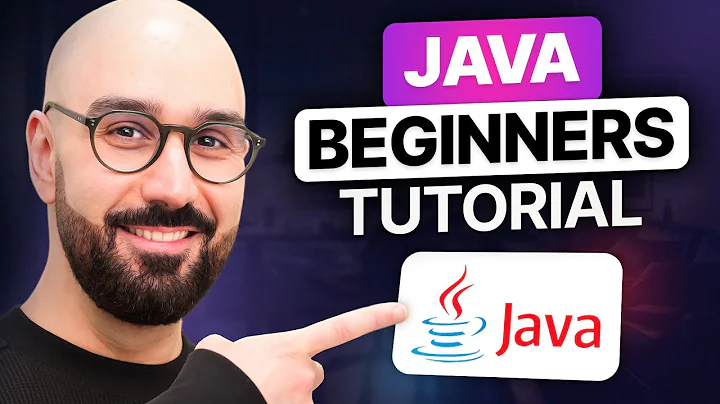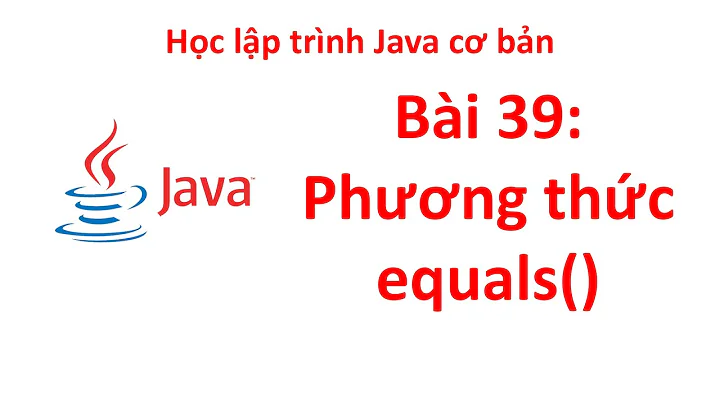Java's L number (long) specification
Solution 1
There are specific suffixes for long (e.g. 39832L), float (e.g. 2.4f) and double (e.g. -7.832d).
If there is no suffix, and it is an integral type (e.g. 5623), it is assumed to be an int. If it is not an integral type (e.g. 3.14159), it is assumed to be a double.
In all other cases (byte, short, char), you need the cast as there is no specific suffix.
The Java spec allows both upper and lower case suffixes, but the upper case version for longs is preferred, as the upper case L is less easy to confuse with a numeral 1 than the lower case l.
See the JLS section 3.10 for the gory details (see the definition of IntegerTypeSuffix).
Solution 2
By default any integral primitive data type (byte, short, int, long) will be treated as int type by java compiler. For byte and short, as long as value assigned to them is in their range, there is no problem and no suffix required. If value assigned to byte and short exceeds their range, explicit type casting is required.
Ex:
byte b = 130; // CE: range is exceeding.
to overcome this perform type casting.
byte b = (byte)130; //valid, but chances of losing data is there.
In case of long data type, it can accept the integer value without any hassle. Suppose we assign like
long l = 2147483647; //which is max value of int
in this case no suffix like L/l is required. By default value 2147483647 is considered by java compiler is int type. Internal type casting is done by compiler and int is auto promoted to Long type.
long l = 2147483648; //CE: value is treated as int but out of range
Here we need to put suffix as L to treat the literal 2147483648 as long type by java compiler.
so finally
long l = 2147483648L;// works fine.
Solution 3
I hope you won't mind a slight tangent, but thought you may be interested to know that besides F (for float), D (for double), and L (for long), a proposal has been made to add suffixes for byte and short—Y and S respectively. This would eliminate to the need to cast to bytes when using literal syntax for byte (or short) arrays. Quoting the example from the proposal:
MAJOR BENEFIT: Why is the platform better if the proposal is adopted?
cruddy code like
byte[] stuff = { 0x00, 0x7F, (byte)0x80, (byte)0xFF};can be recoded as
byte[] ufum7 = { 0x00y, 0x7Fy, 0x80y, 0xFFy };
Joe Darcy is overseeing Project Coin for Java 7, and his blog has been an easy way to track these proposals.
Solution 4
These are literals and are described in section 3.10 of the Java language spec.
Solution 5
It seems like these would be good to have because (I assume) if you could specify the number you're typing in is a short then java wouldn't have to cast it
Since the parsing of literals happens at compile time, this is absolutely irrelevant in regard to performance. The only reason having short and byte suffixes would be nice is that it lead to more compact code.
Related videos on Youtube
jbu
Updated on July 13, 2021Comments
-
jbu almost 3 years
It appears that when you type in a number in Java, the compiler automatically reads it as an integer, which is why when you type in (long)
6000000000(not in integer's range) it will complain that6000000000is not an integer. To correct this, I had to specify6000000000L. I just learned about this specification.Are there other number specifications like for short, byte, float, double? It seems like these would be good to have because (I assume) if you could specify the number you're typing in is a short then java wouldn't have to cast it - that is an assumption, correct me if I'm wrong. I would normally search this question myself, but I don't know what this kind of number specification is even called.
-
jbu about 15 yearsthat would be nice...I've always found that all the casts are really annoying
-
 davidcesarino over 12 yearsLate entry: removing potential sources of ambiguity is always good, and I don't disagree... but I believe if you find yourself confusing
davidcesarino over 12 yearsLate entry: removing potential sources of ambiguity is always good, and I don't disagree... but I believe if you find yourself confusing1withland0withO(and so on), your priority is to set the font right (if you can), then worry about making sure you don't miss the Shift key. -
 luigi7up over 11 years@SimonNickerson I have a question about suffixes... If I declare a long or a double variable like:
luigi7up over 11 years@SimonNickerson I have a question about suffixes... If I declare a long or a double variable like:long _lo = 30;and not30Ldoes this mean my variable will be converted into float ? Or in case of_lo = _lo + 2.77that_lowill be casted into float although it was declared as long -
fmunshi over 11 yearsNo, floats are not involved here. In the first case,
30is anintwhich gets automatically converted via a widening conversion to along. In the second case, your statement is illegal. You'd have to explicitly cast the right hand side to long, e.g._lo = (long) (_lo + 2.77) -
crush almost 11 yearsI take it this didn't make it into Java 7. Any word on if it will make it into a future update or Java 8?
-
brady almost 11 years@crush I tried looking into it a few months back, and as far as I could tell, the proposal had been abandoned. We did get _ in numeric literals and the
0bprefix for binary literals though. Whoop. -
dingalapadum about 7 years@DavidCesarino changing the font fixes the ambiguity for you - in that particular editor where you've set it right. Changing l to L fixes the ambiguity for everybody who might ever read your code including yourself when you are reading the code in a different Editor, IDE, looking at the source on the web (review tools, repositories, etc..). IMHO the priority is not to miss the Shift key. Btw. what font do you recommend? I like monospace and it's the default almost in all editors, CLIs etc that I've see and in this font
land1(0andOresp.) are fairly similar. -
 davidcesarino about 7 years@dingalapadum As I said, you're right. Removing sources of ambiguity is definitely a right thing to do. I just said you should try not to use any editor where you could easily mistake them. In other words, the old suggestion of coding defensively, but not depending on it. About the font, it is very personal, but I always use Deja Vu Sans Mono whenever I can because 1) it is monospaced; 2) it doesn't have ambiguities between characters; and 3) I like its shapes, beautiful and graceful, almost like a good, readable sans-serif font (other good programming fonts feel too "metallic" IMHO).
davidcesarino about 7 years@dingalapadum As I said, you're right. Removing sources of ambiguity is definitely a right thing to do. I just said you should try not to use any editor where you could easily mistake them. In other words, the old suggestion of coding defensively, but not depending on it. About the font, it is very personal, but I always use Deja Vu Sans Mono whenever I can because 1) it is monospaced; 2) it doesn't have ambiguities between characters; and 3) I like its shapes, beautiful and graceful, almost like a good, readable sans-serif font (other good programming fonts feel too "metallic" IMHO). -
 JoelBonetR over 6 yearsI usually use Roboto mono on my IDEs, it makes it easy to read.
JoelBonetR over 6 yearsI usually use Roboto mono on my IDEs, it makes it easy to read. -
 JoelBonetR over 6 yearsThis proposals are probably implemented on kotlin instead of java, as oracle don't want the community tell them how to work... we're on 2018 and still nothing about this proposal, sadly
JoelBonetR over 6 yearsThis proposals are probably implemented on kotlin instead of java, as oracle don't want the community tell them how to work... we're on 2018 and still nothing about this proposal, sadly -
The incredible Jan about 4 yearsI would really be interested in what you meant back in the days. In both cases I get 2147483647 and I don't understand why I should expect something else.
-
Brett about 4 years@TheincredibleJan You would rightly expect
Integer.MAX_VALUE, however if there was no way to distinguish betweenintandlongliterals it would be ambiguous. / I've no recollection of this question, but have clarified my answer anyway. -
 Ali Al Amine over 2 yearsit is confusing. why do we need to add
Ali Al Amine over 2 yearsit is confusing. why do we need to addLto cast it if it's already defined asLong. why doesn't the compiler treat the number as integer and cast it ifLis added.













![[MOB1014 - Java 1] Assignment GĐ2 P2: Sắp xếp theo tên, lương và xuất top 5 (Source Code Download) ✔](https://i.ytimg.com/vi/kRtIpPVvKnY/hq720.jpg?sqp=-oaymwEcCNAFEJQDSFXyq4qpAw4IARUAAIhCGAFwAcABBg==&rs=AOn4CLCNkephXnKuGWG5RG21MV6JH56FaA)